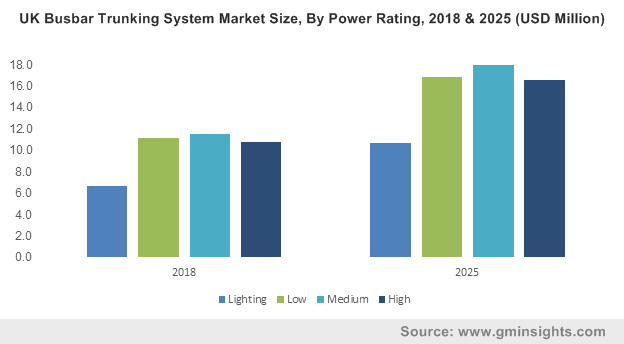Busbar trunking system market to amass substantial valuation by 2024, rising demand for cost-effective energy to fuel the industry growth
Publisher : Fractovia | Published Date : 2017-12-22Request Sample
Considering the increasing complexity associated with power distribution & transmissions systems, reputed giants in busbar trunking system market have been continuously involved in innovating technologically advanced products. Siemens, for instance, one of the most renowned players in busbar trunking system industry, seems to have amply prepared itself to gear up for today’s diverse technology driven scenario. In fact, to promote innovations in bus trunking system market, Siemens has undertaken initiatives to promote new product developments by not only partnering with research institutes and universities but also by investing and collaborating with start-up companies. In addition, the company has been striving to find lucrative solutions for smart grids by building new technology facilities. Furthermore, it has also focused on improving the energy efficiency of renewable and conventional power sources by minimizing certain losses during power transmission. Siemens’s participation in enhancing power distribution depicts how the involvement of renowned behemoths will have a major role to play in propelling the overall busbar trunking system market share.
Europe Busbar Trunking System Market Size, By Power Rating, 2016 & 2024 (USD Million)

Of late, busbars have been gaining mass popularity, owing to the convenience and safety they offer over conventional cables. Moreover, with suitable enclosures and better insulation protection, busbars prevent damage to cables from foreign particles. Additionally, they are rather cost-effective when compared to traditional trunking and cabling systems, pertaining to their lesser installation costs. Aided by its myriad benefits, busbar trunking system industry size is likely to increase substantially in the years ahead. However, it is prudent to mention that these systems have several other benefits over cabling systems, some of which are mentioned below:
Heat Absorption: Busbars can effectively absorb the heat generated during power transmission and distribution, pertaining to their compact design and well-defined metal casing surface. On these grounds, busbars also occupy lesser space and generate comparatively lesser electromagnetic fields as compared to cables.
Reduced energy loss and cost savings: As compare to cables, busbar has lower resistance, which results in minimum loss of energy during power distribution and transmission. In addition, the lesser cost associated with busbar installation has emerged to be a major driver of busbar trunking system market share.
Depleting fossil fuel resources and the shifting trends toward the growing adoption of renewable energy solutions in order to meet increasing requirement of energy have been projected to majorly propel busbar trunking system industry share. The energy efficiency initiatives undertaken by several regulatory bodies and the significant stand taken by various regional governments to promote the usage of electric vehicles will also have a positive impact on product demand. Reputed companies across the automotive, manufacturing, and power generation domains have been striving to adopt numerous tried-and-tested and novel growth strategies, which in all probability, would commendably impact busbar trunking system industry outlook. A couple of such initiatives undertaken by globally renowned giants is enumerated below:
Impact of initiatives undertaken by renowned aircraft manufacturers on busbar trunking system market
Recently, Rolls-Royce, Siemens, and Airbus jointly collaborated to develop a near-term flight demonstrator, which can be used in innovative hybrid-electric propulsion for aircraft. In the futuristic E-Fan X hybrid electric technology demonstrator, these companies are probably going to implement high-end propulsion and electric technologies. With this demonstration, it is vividly coherent that these behemoths have been focusing on more efficient and less fossil fuel dependent transportation to meet EU’s emission goals. Ongoing developments such as the aforementioned, to manufacture reliable, safe, and efficient electrically-powered aircraft are thus slated to boost busbar trunking system industry share.
Investment in new energy storage technology infrastructure development to propel busbar trunking system market
In order to fulfill the surging demand for sustainable and renewable energy, major players in grid-connected energy storage sector have been joining hands with energy technology companies to collaboratively increase power generation capabilities. With the deployment of energy storage across various utility applications and electric power networks, these biggies have been looking forward to optimizing their investments in infrastructure, improve network flexibility, and boost the low-cost integration of electricity generated from renewable energy sources, which in consequence, would impact busbar trunking system market size. For instance, the AES Corporation recently collaborated with Siemens AG to form a new energy storage technology company, Fluence to meet the demand for flexible, cost-effective, and scalable energy storage facilities.
The ongoing and upcoming construction of power plants across various countries has been chronicled as another major factor that would propel busbar trunking system industry share over the years ahead. Besides, numerous goods manufacturing companies have also been investing heavily in research and development activities in order to deploy digitalized facilities at their production plant. For instance, the well-known sporting goods producer, Adidas has partnered with a renowned giant in busbar trunking system industry, Siemens to support transparent, fast, and individualized production of goods at its SPEEDFACTORY. This instance clearly validates that the competitive spectrum of busbar trunking system market would be heavily influenced by major M&As and partnerships in the years ahead. With equitable and safe power distribution being the buzzword lately, busbar trunking system industry is likely to traverse a positive growth path over 2017-2024.